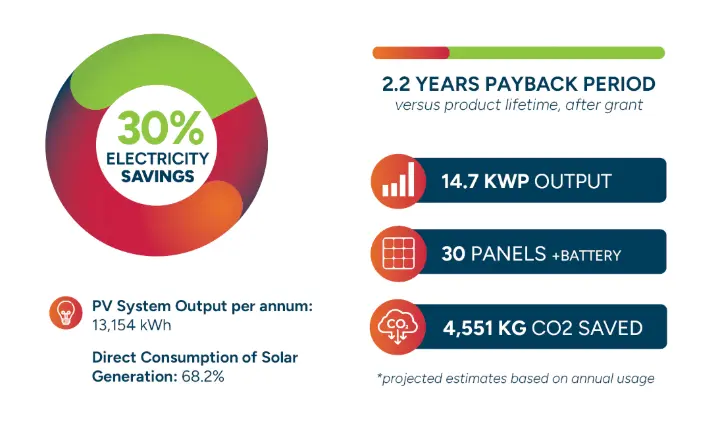Joe Swayne’s farm in Ballon, Co. Carlow, is committed to sustainable agriculture. With increasing energy costs and a strong focus on reducing environmental impact, Joe opted to integrate solar energy into his farm. By leveraging the TAMS grant, which can cover up to 60% of installation costs, Joe made a strategic investment in renewable energy.
Project Goals
- Reduce Grid Dependency:
Empower agricultural operations with solar panels to achieve higher
levels of self-sufficiency.
- Support Sustainability:
Reduce carbon emissions, aligning agricultural practices with
environmental goals.
- Improve Energy Efficiency:
Optimise energy generation and consumption with integrated storage
solutions.
- Leverage Financial Support: Utilize TAMS grants to make solar panel installations affordable for farmers, with grants covering up to 60% of the costs.
The Challenge
The primary goal was to reduce reliance on grid electricity, cut operational costs, and decrease carbon emissions. The farm required a solar PV solution that could power daily operations effectively and store energy for peak usage.
The Solution
Solgrid installed a 14.7 kWp Solar PV system consisting of 30 high-efficiency Q-Cell panels, two Huawei inverters, and a 5 kW battery system. This setup optimises energy generation, storage, and consumption, ensuring the farm operates sustainably.
System Performance Figures:
- Annual Output: 13,154
kWh
- Direct Consumption of Power:
68.2%
- Level of Self-Sufficiency: 29.9%
Financial Metrics
- Internal Rate of Return
(IRR): 50.97%
- Electricity Production Cost: €0.079/kWh
Carbon Savings
- Annual Savings: 4,551 kg
CO₂ emissions avoided per annum.
- Lifetime Savings: 136,530 kg over the system’s 30-year product lifespan.
Yearly Equivalencies:
Trees planted: 75
Coal saved: 2,293 kg
Kilometres avoided: 18,650

Key Benefits
- Sustainability Leadership:
Avoiding 4,551 kg of CO₂ emissions annually demonstrates a
commitment to environmentally responsible farming.
- Significant Energy Savings:
68.2% of generated solar energy is consumed directly, reducing
reliance on grid electricity.
- Rapid Payback Period:
The system’s 2.2-year amortization period ensures a swift return
on investment.
- Enhanced Self-Sufficiency:
Achieving 29.9% self-sufficiency allows the farm to operate more
independently.
- Financial Viability: With an IRR of 50.97%, the investment in solar panels offers excellent long-term financial returns.
The Result
Joe Swayne’s Solar PV installation exemplifies how agricultural solar panels can reduce carbon emissions, provide significant energy savings, and contribute to sustainability in farming.
Agricultural Solar Panels for Farm in Carlow